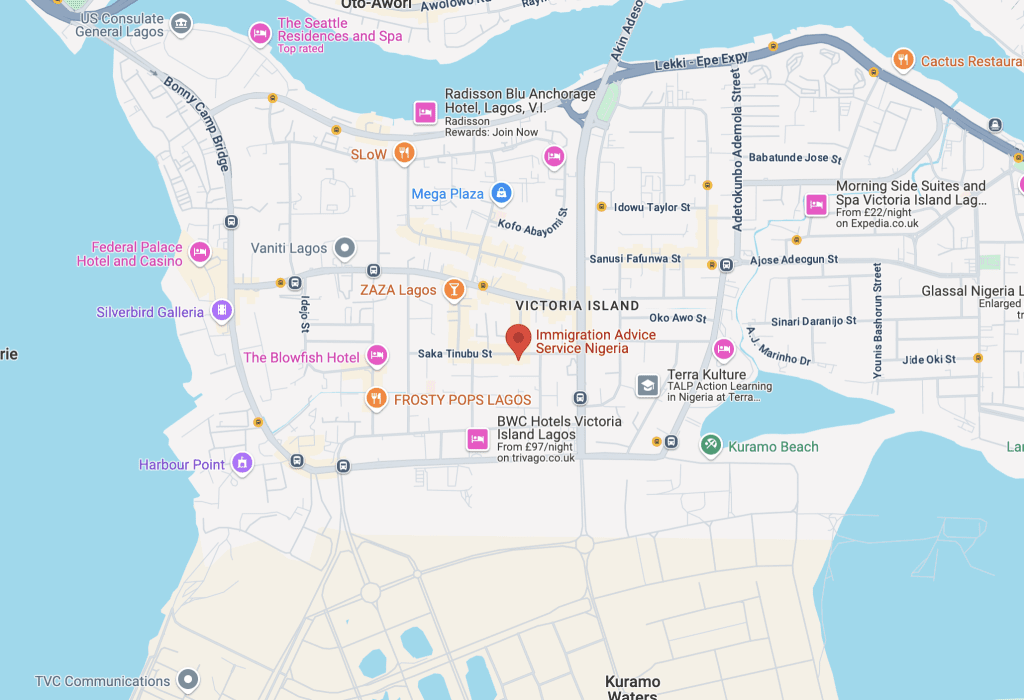UK Permanent Residence for Nigerians
If you’re a Nigerian citizen looking to settle permanently in the UK, there are a range of routes and options available to you.
IAS works across the UK and Nigeria to help clients achieve their immigration goals. For more information about the services we provide and what we can do for you, call our UK number on +44 (0) 3316300929 or our Nigerian number on +2342013438882. Or, use the online contact form to submit an enquiry.
Read our 1001 reviews
Request a call back from our immigration experts
Immigration Advice Service Nigeria
Benefits of Choosing IAS for Your Residency Application
IAS is the ideal choice for a range of UK residency applications, such as indefinite leave to remain, long residence and permanent settlement.
Our expert, capable lawyers can help address a wide range of issues and concerns, helping to make the process of applying for residency simple and hassle-free.
At IAS, we are committed to offering the highest-quality level of service available in the law sector. When getting in touch with us for help, you will:



Fully understand all the steps you need to take to succeed in your residency application.



Be fully prepped on all Home Office-required documents and evidence you will need to submit.



Receive regular check-ins from your personal immigration lawyer throughout the entire process.



Continue to receive support from your lawyer to address any requests from the Home Office.
Services we Provide
Wondering How You Can Settle in the UK?
We have helped many Nigerians settle in the UK. Our friendly and professional immigration advisers can work with you on a one-to-one basis to help determine the most ideal route for you to obtain UK permanent residency.
Maximise your chances of success with IAS’s help and advice.
Nigerian Emigration
For Nigerian emigration matters, please call +44 (0) 3316300929 or +2342013438882.
Other Immigration and Emigration Matters
For immigration/emigration to/from other countries, please call:
US – +1 844 290 6312
Ireland – (+353) 061 518 025
UK – (+44) 333 4149244
Overview of UK Permanent Residence
UK permanent residence is a broad term that refers to the status of being able to permanently reside in the UK. Individuals with this status can live, work and study in the UK on a permanent basis for an indefinite amount of time. They can also travel to and from the UK without being subject to immigration control.
Anyone who is a family member of someone with permanent residence status may also apply to join them in the UK.
There are two main ways that Nigerian citizens can obtain UK permanent residence status. These are:
- Indefinite leave to remain
- Right of abode
There are also other ways in which to obtain permanent residence in the UK, such as the EU Settlement Scheme and if you’re a stateless individual. However, if you’re a Nigerian citizen, it is much more likely that you’ll be able to obtain permanent residence through the two main routes listed above.
Applications for UK permanent residence are made easier with the assistance of a professional immigration adviser by your side. Reach out to IAS for expert assistance with your application to maximise your chances of success. Call us on +44 (0) 3316300929 if you’re in the UK, or +2342013438882 if you’re in Nigeria. Or use the online form to get in touch.


Indefinite Leave to Remain
Indefinite leave to remain (ILR) is one of the main ways in which foreign nationals can obtain permanent residence in the UK.
It is a status normally given to those who have spent a certain number of qualifying years in the UK with a valid visa. This period of time is usually 5 years, but can also be 2, 3 or 10 years in certain circumstances.
Like other forms of permanent residence, ILR will allow you to live, work and study in the UK without any restrictions. You will also be able to access public funds and use NHS healthcare services for free.
Note, however, that there are still restrictions to ILR and other forms of permanent residency. For example, you won’t be able to vote or hold public office. You may also lose your permanent resident status if you spend too much time outside of the UK.
You will also not be able to apply for a British passport with ILR, although you will be able to once you apply for British citizenship through naturalisation. Most applicants will be able to do this once they have spent 12 months in the UK with ILR.
What Are the Eligibility Criteria for Indefinite Leave to Remain?
To be able to apply for indefinite leave to remain, you must have lived in the UK for a certain period of time with a valid visa that leads to the option of permanent settlement. The length of this period of time will depend on what visa you’re in the UK with.
Once you’ve met this residency requirement, you’ll then need to meet additional criteria in order to be eligible for ILR. You must:
- Meet the specific eligibility criteria for your visa route. In most cases, this will be the same as the original eligibility criteria that allowed you to obtain your visa to travel to the UK
- Pass the Life in the UK Test
- Prove your knowledge of English
- Have enough money to pay the application fee
The eligibility criteria for indefinite leave to remain may well differ for each individual. It’s important to ensure that you’re fully aware of what you need to do in order to become eligible according to the guidelines set out by your chosen visa route.


What is the Life in the UK Test for ILR?
The Life in the UK Test is one of the mandatory eligibility criteria for applying to indefinite leave to remain.
It will test your knowledge on the UK’s politics, history, society and customs. You will have 45 minutes to answer a total of 24 questions, after which you will be given a pass or a fail.
A pass can only be achieved if you answer at least 18 questions correctly.
Most applicants for ILR will have to take the test, unless:
- You are under 18 or over 65
- You have a long-term physical or mental condition that prevents you from taking the test
It costs £50 to take the test. The test must be taken at an approved test centre in the UK.
English Language Requirements for ILR
Overview
Another key requirement for ILR is being able to speak English to the minimum standard.
You can prove your ability in English by:
- Passing a Secure English Language Test (SELT) at B1 level or higher
- Having a degree that was mainly taught in English
If you need to take a SELT to prove your English language test, you can do so via one of the English language test providers approved by the Home Office.
If you need to provide evidence of an educational qualification, you may need to obtain a certificate from Ecctis confirming that your degree is equivalent to a UK qualification, or to confirm that the degree was taught in English if it is from a non-majority English-speaking country.
Exemptions
You may not need to prove your English language skills for ILR if you’re applying using any of the following visas. This is because you will have already proven your language skills when you applied for that specific visa:
- Skilled Worker, T2 or tier 2 visa
- Representative of an Overseas Business visa
- Minister of Religion visa (T2)
- International Sportsperson visa
- UK Ancestry visa
- Global Talent visa
- Innovator Founder visa
- International Agreement visa (Temporary Work)
- Domestic Worker in a Private Household visa
- Scale-up Worker visa
In addition, you will not need to prove your language skills for ILR if:
- You’re 65 or over
- You have a long-term physical or mental condition that prevents you from proving your language skills
- One of the other official exemptions applies to your situation, such as if you’re applying as a victim of domestic violence, a refugee or someone in exceptional circumstances.
How to Apply for ILR
Overview
You should apply for ILR online through the gov.uk website.
As part of the application process, you will need to provide a range of personal information and supporting documentation to establish that you are eligible for ILR status.
You will also need to provide specific evidence that you are eligible for ILR based on your chosen visa route.
In most cases, you should apply for indefinite leave to remain before your current UK visa expires.
ILR Fees and Processing Times
Applying for indefinite leave to remain costs £3,029.
Each application should normally take around 6 months or less to be processed by the Home Office. However, this may be longer if there are any delays in the system, your case is a particularly complex one, or if the Home Office needs to contact you to request any further information or supporting documents for your application.
Right of Abode
Overview
Right of abode is another way in which foreign nationals can settle in the UK permanently. Similarly to indefinite leave to remain, it allows the holder to live, work and study in the UK without restriction, and allows them to travel to and from the UK without being subject to immigration control.
However, unlike ILR, right of abode is a broader categorisation of status that applies to a large group of people, including all British citizens and certain Commonwealth citizens.
Eligibility
If you’re a Nigerian citizen, it’s possible that you may have right of abode. You may be eligible for this status if all of the following apply:
- One of your parents was born in the UK and a citizen of the United Kingdom and colonies when you were born or adopted
- You were a Commonwealth citizen on 31 December 1982
- You did not stop being a Commonwealth citizen (even temporarily) at any point after 31 December 1982
Alternatively, you may also have right of abode through marriage if you’re a female Nigerian citizen. You may have right of abode if:
- You’ve been married to someone with right of abode before 1 January 1983
- You’ve not stopped being a Commonwealth citizen at any point after 31 December 1982
How Can I Prove I Have Right of Abode?
Overview
You can prove that you have right of abode by applying for a certificate of entitlement.
A certificate of entitlement is a document that is placed in your passport. Note that you cannot apply for a certificate of entitlement if you have a British passport or if you already have a certificate of entitlement in another foreign passport.
If you’re eligible, you should apply for your certificate of entitlement online through the gov.uk website.
You’ll normally need to provide your personal details and documentary evidence in order to establish that you’re eligible for right of abode status. You may also have to attend an appointment at a visa application centre.
Fees and Processing Times
If you’re applying from inside the UK, a certificate of entitlement will cost £589.
If you’re applying from outside the UK, a certificate of entitlement will cost £589.
Applications for certificates of entitlement generally take around 6 months to be processed.
Alternative Routes to Permanent Residence
Overview
Apart from indefinite leave to remain and right of abode, there are two other ways in which you might be able to obtain permanent residence in the UK. These are the EU Settlement Scheme and the route for stateless individuals.
Stateless Individuals
Permanent residence in the UK can be obtained if you’re a stateless individual. Both of the following must apply if you wish to apply through this route:
- You’re not a citizen of any country
- You’re unable to live permanently in any other country
You can only apply for this route if you’re already currently in the UK.
EU Settlement Scheme
The EU Settlement Scheme is specifically for EU citizens or family members of EU citizens who settled in the UK before 31 December 2021. It allows applicants to permanently live and work in the UK and enjoy the same benefits as other individuals with permanent resident status.
The deadline to apply for this scheme was 30 June 2021. However, you still may be eligible to apply for the scheme after this date if:
- You’re joining an EU family member in the UK who was living in the UK by 31 December 2021
- You have “reasonable grounds” for applying late, such as if you were the victim of domestic abuse or if you have medical reasons that stopped you from applying
- Another one of the special exemptions applies to your situation
The EU Settlement Scheme is free to apply for.
How Can IAS Help?
Permanent residence in the UK is a highly desirable goal for many, as it allows individuals the right to reside in the UK for good.
If you’re a Nigerian citizen looking to obtain permanent residence in the UK, IAS can help.
We are expert and friendly immigration lawyers who can help you obtain permanent residency status in the UK. We offer a range of services in both Nigeria and the UK to help applicants navigate the complex UK immigration rules and successfully settle with their chosen immigration status.
Whether you’re looking for potential visa options leading to indefinite leave to remain, need help in discerning your eligibility for right of abode, or just need to talk one-on-one with an immigration adviser about your personal circumstances, we can help.
We have offices throughout the UK and in Lagos. For more information about the services we offer and what we could do for you, reach out to us on +44 (0) 3316300929 if you’re in the UK or +2342013438882 if you’re in Nigeria. Or, use the online contact form to get in touch.
Table of Contents
Table of Contents will appear here.Legal Disclaimer
The information provided is for general informational purposes only and does not constitute legal advice. While we make every effort to ensure accuracy, the law may change, and the information may not reflect the most current legal developments. No warranty is given regarding the accuracy or completeness of the information, and we do not accept liability in such cases. We recommend consulting with a qualified lawyer at Immigration Advice Service before making any decisions based on the content provided.
Frequently Asked Questions
If you have indefinite leave to remain status, you will risk losing your status if you spend more than two continuous years outside of the UK.
However, you may be able to re-obtain your status by applying for a Returning Resident visa.
You cannot ordinarily lose right of abode by spending a certain number of days outside the UK.
Yes. You may be able to obtain permanent residency in the UK through seeking asylum as a refugee or asylum seeker.
In order to be eligible, you must be unable to live in your own country as you fear persecution because of a characteristic such as your race, religion, nationality, political opinion, etc.
If your asylum application is approved, you may be classed as a Group 1 refugee, which will allow you to stay in the UK for a minimum of 5 years.
After 5 years has passed, you will then be able to apply for indefinite leave to remain.
According to Home Office guidance, individuals who intend to stay for longer than 6 months in the UK must normally be referred for a medical test before having a visa granted.
Medical tests will normally take place to ensure that:
- You won’t endanger the health of other people in the UK
- There won’t be any medical reasons to stop you supporting yourself or your dependents in the UK
- You won’t require any major medical treatment
If you’re at risk of any of the above, your visa application may not be approved.
In addition, all Nigerian long-term visa applicants are required to take a test for tuberculosis before travelling to the UK. You may not be allowed to travel to the UK if you are found to have tuberculosis.
After you acquire permanent residence in the UK, you will be eligible to bring your family members to the UK on dedicated family visas such as the Spouse visa, Child visa or Dependent Adult visa.
Note that if you’re on a visa route that leads to indefinite leave to remain, you may also already have the ability to bring your family members with you to the UK. It’s important to closely check the conditions of your visa to see if this is something you’re eligible to do.


What our clients are saying
How our UK Immigration Lawyers can help
At the Immigration Advice Service our lawyers specialise in a wide range of UK visas, nationality and asylum applications and have represented clients in various successful complex and high-profile cases.





















